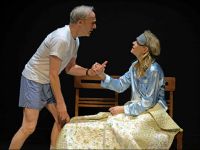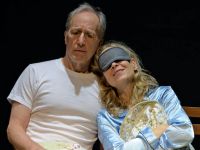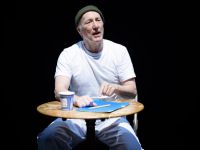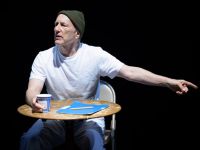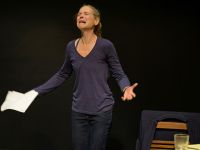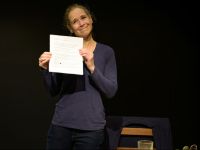
★★★★★
“PERHAPS ONE OF THE BEST PERFORMANCES YOU WILL SEE AT THE FRINGE THIS YEAR”
★★★★★
'tragic themes... superbly acted'
Interview with Andrew Read
Deep Flight Productions brought Pulitzer Prize winner Lanford Wilson’s rarely produced one-act plays to life in WHO WE BECOME, a compelling trilogy performed in repertory at 59E59 Theaters from July 17–19 as part of East to Edinburgh 2025. See photos from the production.
The production will next travel across the Atlantic for a full run at the Edinburgh Festival Fringe, August 1–23 at theSpace @ Surgeons’ Hall.
WHO WE BECOME showcases three distinct works by Wilson:
-
Breakfast at the Track, a sharp and witty look at marital tension;
-
The Moonshot Tape, in which a hometown interview with a successful writer takes a dark turn;
-
A Poster of the Cosmos, a gripping interrogation surrounding an unresolved crime.
Directed by Mark Cirnigliaro, the production stars Margaret Curry (Three by Tennessee, Lonely, I’m Not) and Geoff Stoner (Nightsweat, The Trysting Place), with Toni Bashinelli serving as consulting producer. Tickets and additional information are available at www.deepflightproductions.com.
Lanford Wilson, a seminal voice in American theater, helped define the Off-Off-Broadway movement with works such as Home Free!, The Madness of Lady Bright, and Balm in Gilead. Winner of the 1980 Pulitzer Prize for Talley’s Folly, Wilson is celebrated for his experimental structures and vivid portraits of American life, particularly through his collaborations with the Circle Repertory Company, which he co-founded. WHO WE BECOME offers audiences a rare opportunity to engage with three of his lesser-known yet thematically rich one-acts.
Photo Credit: Matt Simpkins
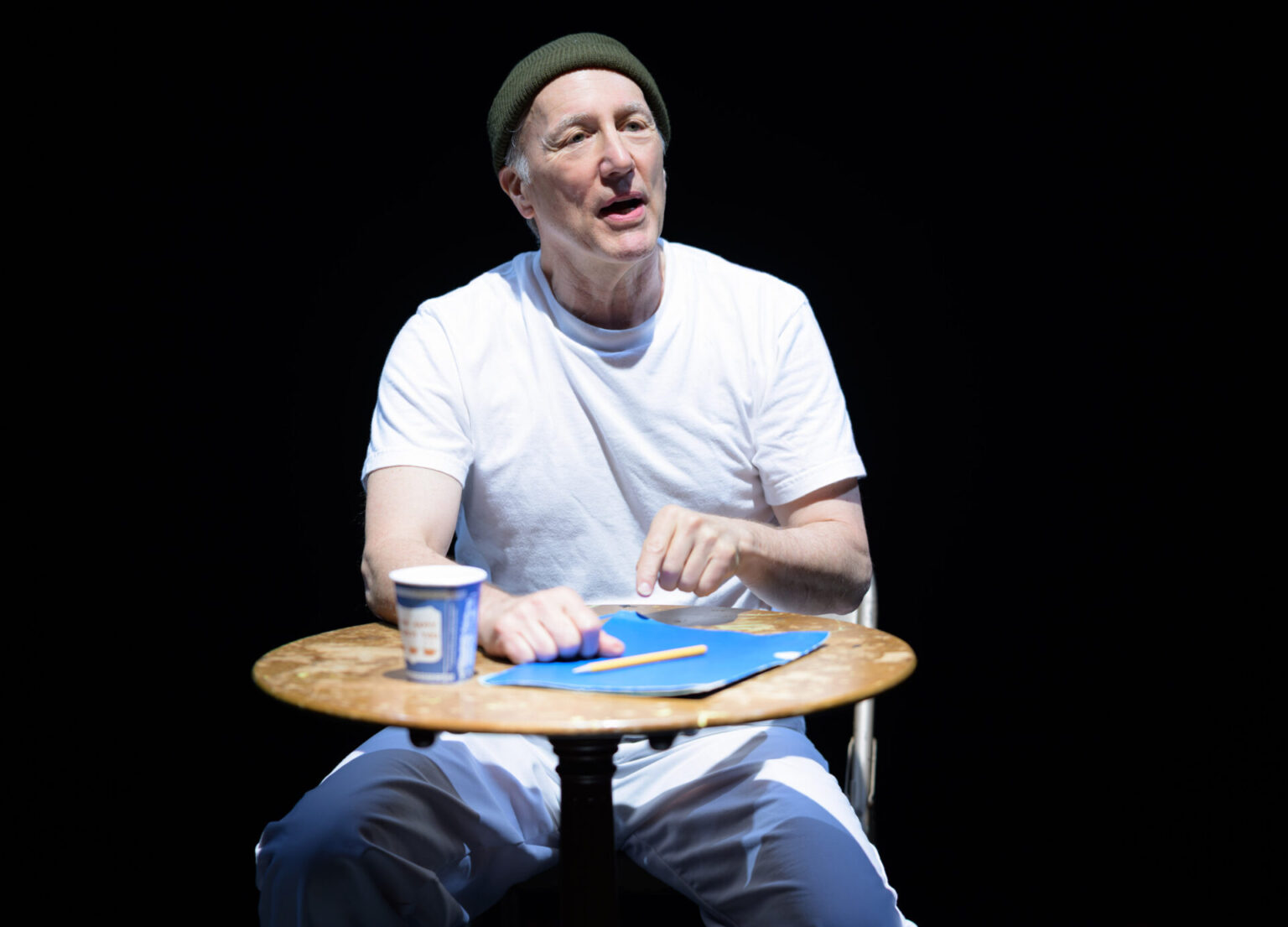
The off-off-Broadway icon, Lanford Wilson, is one of the foremost dramatists in the experimental theater scene—a Pulitzer Prize-winning playwright whose work often tells stories of those most marginalized in society. Wilson passed away in 2011, but his work is still performed today. Who We Become, presented by Deep Flight Productions and directed by Mark Cirnigliaro, is a series of one-act plays by Lanford Wilson. I witnessed “A Poster of the Cosmos” and “The Moonshot Tape”, but Who We Become also includes “Breakfast at the Track”.
“You don’t look like the kind of guy who’d do something like that.” Geoff Stoner says mockingly in “A Poster of the Cosmos”. Stoner portrays Tom, a pissed-off baker, sitting in a Manhattan police station undergoing interrogation at the height of the AIDS epidemic. Tom tells us many stories about his relationship to a man named Johnny. He started from when they were strangers, who then became friends, and then lovers.
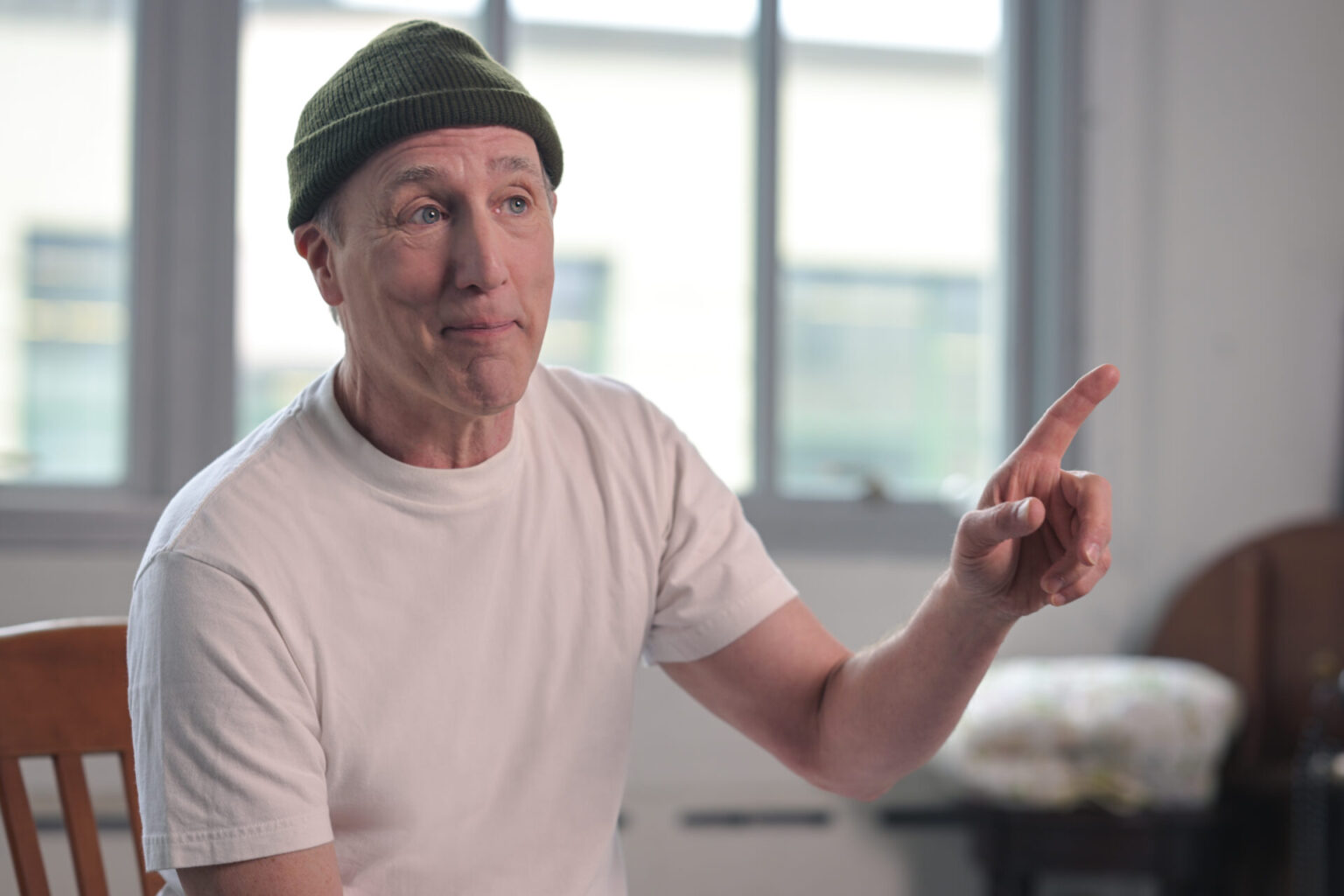
Tom keeps us in the dark as to why he’s in the police station until revealing near the end of the play that Johnny is in the hospital due to AIDS. The reason for Tom’s arrest was that he disrobed completely and got into bed with Johnny. He licked his body, cleaning off all the blood on Johnny. In this act, Tom was taking care of Johnny when most were afraid even to breathe the same air as an AIDS patient. Tom
frightened the hospital staff, and they called the police. “Are you happy now?” Tom asks.
In the blackout, after the play ended, I heard the weeping of an older man beside me. While I was not alive during the AIDS epidemic, I saw how vital “A Poster of the Cosmos” is, especially right now, as there are constant efforts to silence, dismantle, and erase queer voices and history. “A Poster of the Cosmos” not only humanizes, but showcases the complexity of queer people, their lived experience, nuanced history, and trauma. Who We Become is on their way to Edinburgh for this year’s Fringe Festival, and I’m curious to see what it has in store for them.
EYE ON THE ARTS, NY — Frankie Lehr
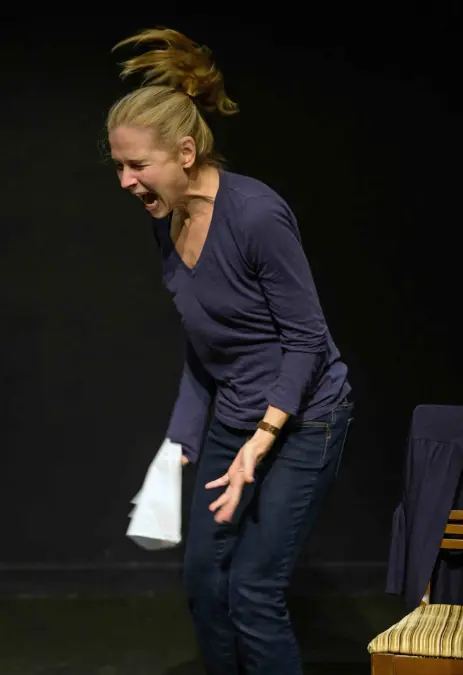
Lanford Wilson was a pivotal figure in theater, particularly known for his impact on the New York experimental scene and for highlighting the stories of marginalized individuals. Though he passed away in 2011, his works, including the collection of short plays in Who We Become, still resonate today. I had the chance to see two of the plays, “A Poster of the Cosmos” and “The Moonshot Tape,” directed by Mark Cirnigliaro and presented by Deep Flight Productions.
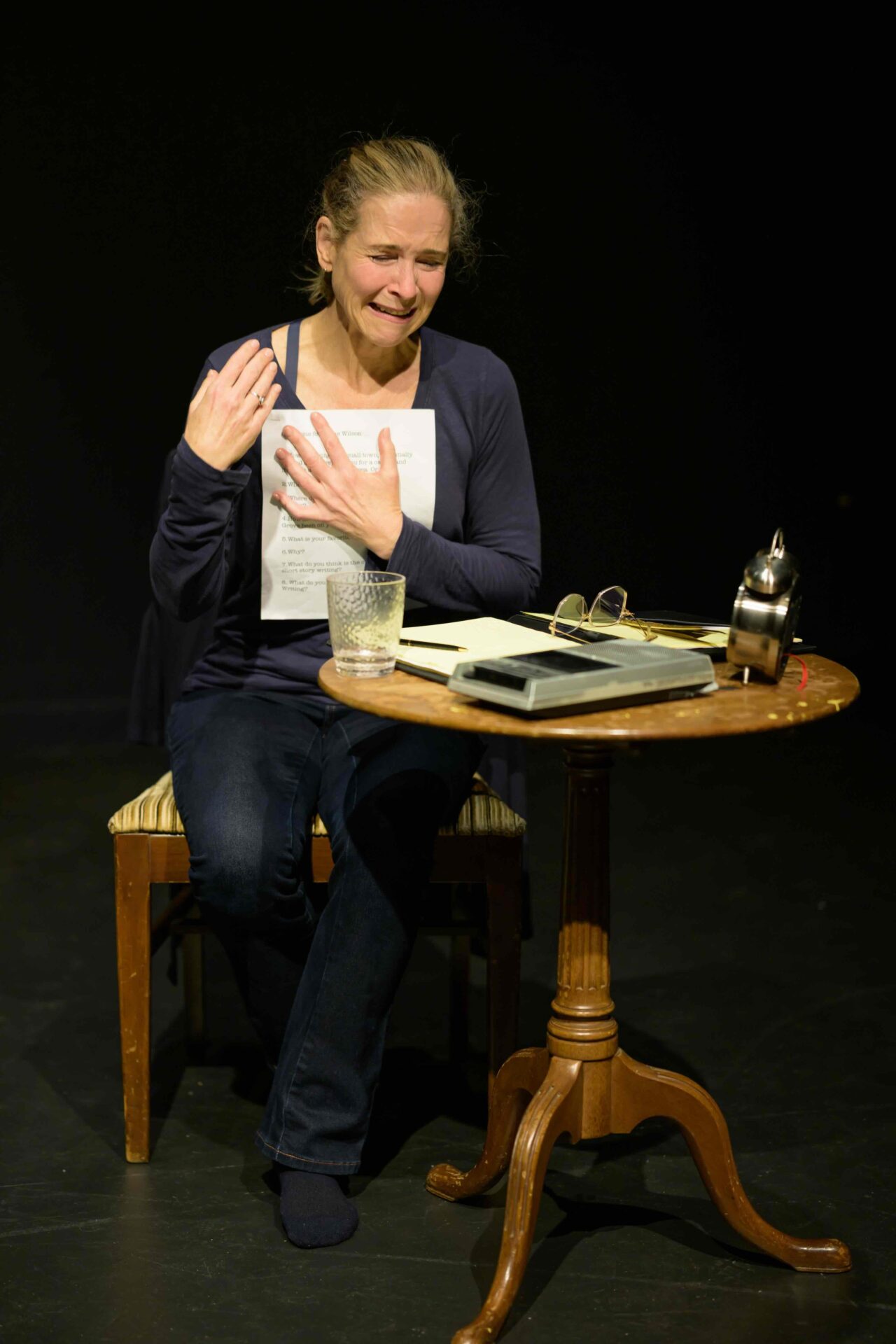
In “The Moonshot Tape” Margaret Curry plays Diane, a drunk short story writer recording an interview for her hometown high school newspaper. “Writing is the only time you can tell the truth and get away with it.” Diane says, before graphically recounting the sexual abuse she endured from her father for years. She struggles to answer the questions given to her on paper and often finds herself telling stories from her youth, college days, and sex life. “Trying to put my adolescence behind me,” Diane dryly states as she fixes herself another drink.
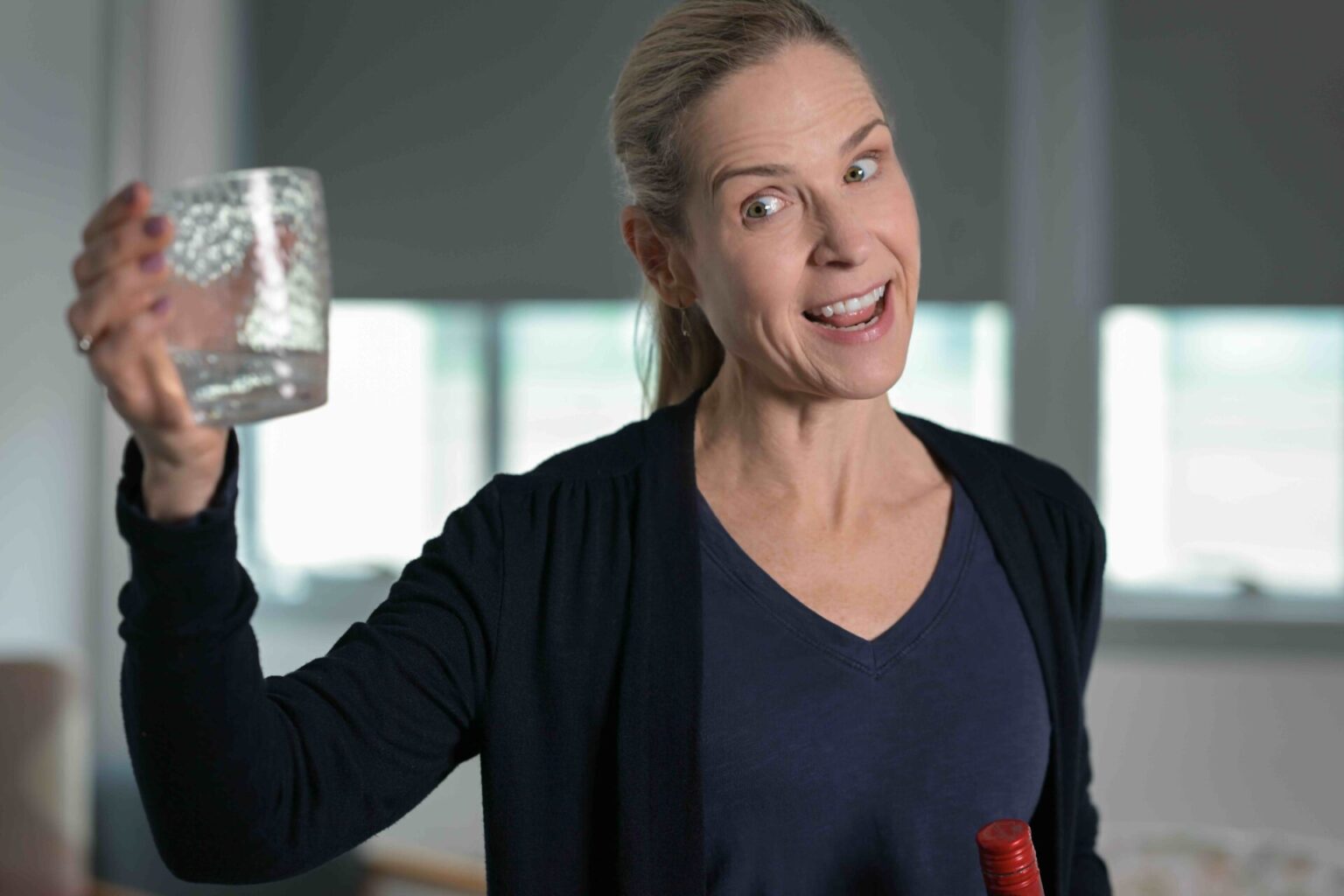
Towards the end of the play, she narrates a story of visiting her father years later, now an established and successful writer. Diane, alone with her father, tied him up and tore off his clothes. She got on top of him and wrote on his chest the story of her assault while she rode him. “This one is for me,” Diane says bitterly after finishing her story of revenge.
“The Moonshot Tape” sheds light on a dark reality that feels both honest and personal. Curry plays Diane with a lovable charm and a dry sense of humor that serves as a needed respite from the darker themes of the play. “The Moonshot Tape” sparks meaningful dialogue regarding the complicated effects and feelings of being sexually assaulted as a child and coping in adulthood. Who We Become now embarks to Edinburgh for this year’s Fringe Festival, and I’m excited to see the incredible plans they have in store.
EYE ON THE ARTS, NY — Frankie Lehr
 Simply outstanding. In this one-woman play, Margaret Curry, an award-winning actress based in New York, plays the captivating and complex character Diane. She’s a successful writer from the city returning to her home town to care for her aged mother. We’re given a vivid portrait of American life, centred around Diane’s interview by a local reporter, whom we never see. As the action progresses, Diane descends into an alcoholic meltdown and gradually a dark and harrowing truth reveals itself. This show is about how hidden truths will inevitably bubble up to the surface. The predominant question posed to the audience is What would you do in these circumstances? Would you seek revenge and, if so, how?
Simply outstanding. In this one-woman play, Margaret Curry, an award-winning actress based in New York, plays the captivating and complex character Diane. She’s a successful writer from the city returning to her home town to care for her aged mother. We’re given a vivid portrait of American life, centred around Diane’s interview by a local reporter, whom we never see. As the action progresses, Diane descends into an alcoholic meltdown and gradually a dark and harrowing truth reveals itself. This show is about how hidden truths will inevitably bubble up to the surface. The predominant question posed to the audience is What would you do in these circumstances? Would you seek revenge and, if so, how?
©Clare Venables for fringereview.co.uk

Lanford Wilson was at one point one of America’s preeminent dramatists – he was awarded the Guggenheim Fellowship in Drama & Performance Art in 1972, the Pulitzer Prize for Drama in 1980, and the PEN/Laura Pels International Foundation for Theater Award in 2004. As co-founder of the Circle Repertory Company, Wilson transitioned in the 1970s from off-off-Broadway to off-Broadway to Broadway, and was instrumental in advancing off-Broadway as a movement – demonstrating that new playwrights could inch closer to West 41st Street in time.
Typically, at the Edinburgh Festival Fringe, I seek out new writing and tend to dismiss revivals or regurgitations of especially famous productions – but I’m certainly glad I made an exception for this, the first part of a two-part concoction of Lanford Wilson’s one-act plays, none of which I had ever read or heard of before this year’s festival. After watching Who We Become, Pt. 1 – an admittedly corny title that does not quite prepare you for the depth, mystery and pain of The Moonshot Tape, the first of the plays presented – I cannot wait to see the other two in the second part.
In The Moonshot Tape, Margaret Curry plays Diane, a successful short story writer who has returned to her hometown in Missouri and sits face-to-face with a journalist from the high school paper she once wrote for. What follows is perhaps one of the best performances you will see at the Fringe this year, as Diane comes to terms with the horrors and traumas of her childhood over the course of the interview. Wilson’s writing veers gracefully across and between topics, supported by a consistently compelling, nuanced and thought-provoking delivery from Curry. The stage is bare-skinned and minimal, as is the direction, allowing Wilson’s distinctly naturalistic dialogue and Curry’s reserved physicality to fully occupy the space.
Overall, this version of The Moonshot Tape by Deep Flight Productions is a triumph – bolstered by a devastating and eloquent central performance.
©broadwaybaby.com
A bickering married couple and an unlikely murder suspect comprise two one acts by the deft Lanford Wilson.
“Breakfast at the Track”
Two years into their marriage, a couple has not reconciled the fact that he’s a morning person, she thrives evenings. The difference in waking hours is so extreme they hardly see one another and rarely have sex. We meet them vacationing in Saratoga.
He rises at dawn with infectiously cheery anticipation of breakfast at the track- watching horses parade, eating eggs and kippers. Never removing her sleep mask, cocooning herself in blankets, she grumbles at the hour, promptly falling back asleep every time he attempts to get her up. Neither enthusiasm nor cuddling evokes success.
“I feel as if we’re on separate vacations,” he says. “I can’t believe you’re still talking,” she gripes. That’s about it. Never the twain shall meet. The piece is so slight, it seems like padding for what follows. Both actors are completely credible, Geoff Stoner in his lightness and frustration, Margaret Curry in her stubborn insistence. One has the feeling both are capable of more demonstrative comedy.
“A Poster of the Cosmos”
1987. A career baker wearing slightly blood stained whites (bravo for nuance), has been brought to a police station for questioning. Wilson doesn’t give the interrogated man a name. Johnny is dead. Was he murdered? “You don’t look like the kind of guy who would do something like this,” he says presuming aloud what the cops are thinking. “What kinda guy is that? I ain’t that kinda guy.”
We learn about the mentally challenged deceased and a relationship that began platonic, then evolved to love. Description of Johnny’s struggles are realistically detailed and wrenchingly described with restraint that makes it all the more powerful. Not until almost the end do we discover precise circumstances.
Geoff Stoner is marvelous. Accent and meter create a whole character. The play’s emotional arc is beautifully paced and moving. Wilson slowly unpeels his story like an onion with parchment like layers. Stoner presents dignity in despair.
Director Mark Cirnigliaro offers solid characters eschewing distracting fuss. He exposes the heart of things creating empathy. Timing is splendid.
Photos by Matt Simpkins
“Who We Become” – One Act Plays by Lanford Wilson
With Margaret Curry and Geoff Stoner
Directed by Mark Cirnigliaro
Part of East to Edinburgh
59E59 Theaters https://59e59.org/
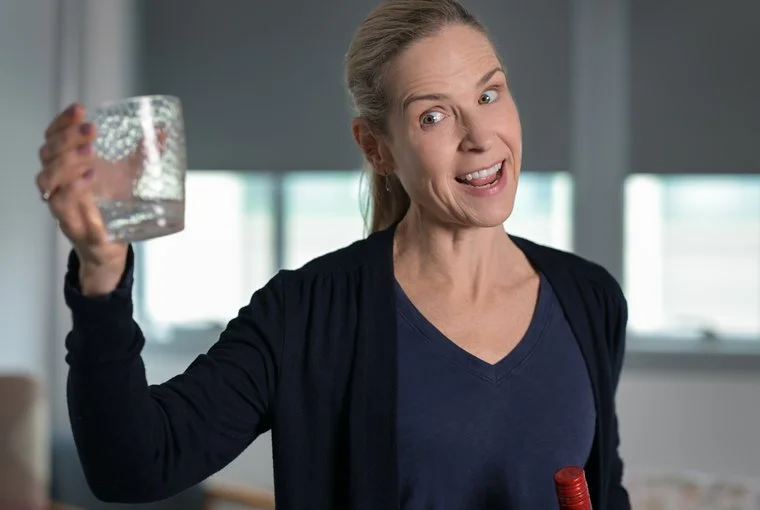 Lanford Wilson, that intrepid chronicler of the American soul and poetic architect of the Off-Off-Broadway movement, remains a towering yet curiously underappreciated figure in the modern theatrical canon—a dramatist whose singular voice resonated through the scrappy experimentalism of early works like The Madness of Lady Bright, and the kaleidoscopic Balm in Gilead, and later found Pulitzer Prize-winning recognition with the tender, structurally audacious Talley’s Folly. A co-founder of the seminal Circle Repertory Company, Wilson honed a language both lyrical and lacerating, forging compassionate yet unflinching portraits of longing, alienation, and the aching, fractured landscapes of American life.
Lanford Wilson, that intrepid chronicler of the American soul and poetic architect of the Off-Off-Broadway movement, remains a towering yet curiously underappreciated figure in the modern theatrical canon—a dramatist whose singular voice resonated through the scrappy experimentalism of early works like The Madness of Lady Bright, and the kaleidoscopic Balm in Gilead, and later found Pulitzer Prize-winning recognition with the tender, structurally audacious Talley’s Folly. A co-founder of the seminal Circle Repertory Company, Wilson honed a language both lyrical and lacerating, forging compassionate yet unflinching portraits of longing, alienation, and the aching, fractured landscapes of American life.
Who We Become, in presenting a triptych of Wilson’s lesser-known one-acts, offers a rare and invigorating immersion into the quieter corners of his oeuvre—an invitation not merely to revisit a master’s voice, but to re-encounter it with fresh ears attuned to its emotional intricacy, formal daring, and ever-relevant human truths. In director Mark Cirnigliaro’s gentle hands, Breakfast at the Track and A Poster of the Cosmos are played with simplicity and subtleties that reveal love in its many guises…sometimes based on deeply moving yearning, and then unsettlingly threadbare.
In the gently whimsical confection that is Breakfast at the Track, we find ourselves not in the throes of grand tragedy or soul-rattling conflict, but rather eavesdropping on the mundane squabbles of a married couple vacationing at a bed-and-breakfast. Their central dilemma—a dispute over the ungodly hour of 6:30 a.m.—is hardly the stuff of Shakespearean torment. This morning-versus-night battle is positively gossamer. And yet, therein lies the charm, and also the disquieting revelation of a two-year marriage on shaky ground.
Geoff Stoner, as the irrepressibly chipper early riser, and Margaret Curry, as his blithe owl-eyed, blanket-clutching counterpart, elevate this miniature domestic standoff into something almost balletic in its precision and comic ingenuity. The script may skate along the surface, but the performers dive deep into the art of timing, nuance, and relational truth. Stoner radiates a bright-eyed earnestness that would make a rooster blush, while Curry’s exasperated grumbles and artfully timed eyerolls when not completely covered by a sleep mask are the stuff of comedic gold.
What emerges is a disarmingly honest and relentlessly funny portrait of matrimonial compromise—less a dramatic meal than a perfectly crafted amuse-bouche…until it reveals something deeper, and somewhat sadder…The husband’s out of the blue “I don’t know about you but I don’t consider this much of a marriage” has us instantly heartbroken. It is a tribute to Cirnigliaro's keen observational instincts and the actors’ delightfully unselfconscious chemistry that we remain so thoroughly entertained by so minor a tiff. In their hands, the everyday becomes quietly revelatory, and the act of waking up becomes, quite simply, a joy to watch.
Set within the confined and unforgiving walls of a Manhattan police station interrogation room, A Poster of the Cosmos unfolds as a taut, deeply affecting monologue—one that challenges its audience not through spectacle but through the unrelenting intimacy of a man’s voice, cornered and cracking under the weight of grief, guilt, and society’s silent prejudices. At the centre of this compact yet emotionally charged one-hander is Tom, a 36-year-old working-class baker whose life has been upended by tragedy—and whose very ordinariness is treated as suspicious by the unseen detectives interrogating him for murder.
Geoff Stoner inhabits the character of Tom with a raw and unvarnished realism that speaks volumes before a word is spoken. In a particularly potent directorial choice, Cirnigliaro deftly signals the play’s preoccupation with judgment, with sides drawn too hastily, and with the dangerous distance between presumption and truth. From the outset, Cosmos is not simply a whodunnit; it is a scathing, slow-burning meditation on the chasm between appearance and understanding.
Tom’s monologue is shaped entirely by his responses to the disembodied voices of the police, a narrative structure that cleverly exposes the audience to the contours of his personality, his past, and his pain through his own defensive, bewildered, and sometimes bitter retorts. One such repeated line from his interrogators—“you don’t look like the kinda guy’d do somethin’ like dat”—is met with Tom’s blistering, matter-of-fact rejoinder: “You spend your day in the armpit of the city and you know nothing about people.” That single line encapsulates the underlying theme of the piece: a searing critique of those who claim worldly wisdom while remaining blind to the truths beneath the surface.
Lanford Wilson’s writing—naturalistic, sharply tuned, and grounded in emotional authenticity—gives Stoner the scaffolding to create a character who never feels performed. Tom’s speech unfolds as though we are hearing thoughts forming in real time. His pauses, hesitations, and half-formed utterances are not mannerisms but manifestations of a mind navigating trauma and memory. As the monologue progresses, we begin to piece together fragments of Tom’s life: a youthful marriage, a child left in the past, a serendipitous meeting at dawn with Johnny, an exuberant delivery man who offered him not just a place to stay but, unexpectedly, love.
The emotional apex of the play lies in its unflinching account of Johnny’s illness—he is diagnosed with AIDS—and the final, agonizing months the couple share together. Tom, having tested negative, holds Johnny as he dies. The heartbreak of surviving, of being left behind, of grappling with survivor’s guilt, all crescendo into a desperate, possibly incriminating act—one that brings us to the interrogation room where we now find him.
Stoner’s performance is unshowy but devastating, his portrayal resisting sentimentality in favor of something more grounded, more piercing. His Tom is not a martyr or a hero but a man—plain, troubled, grieving—trying to explain the unexplainable to a world that has already judged him. This, ultimately, is the tragedy Cosmos lays bare: the automatic, unconscious cruelties of those who assume they know the hearts of others.
In a wry, almost throwaway moment, we learn the play’s title refers not to the celestial or the metaphysical, but to a humble soccer team—a detail that gently underscores the ordinariness of its protagonist, and the tragic irony that such a simple life can be so badly misunderstood.
Originally staged in 1988, A Poster of the Cosmos remains achingly relevant. Its themes—love in the margins, grief misread as guilt, the tyranny of first impressions—have lost none of their urgency. In this spare, direct revival, Cirnigliaro reminds us that even the smallest stories, if told truthfully, can resonate with a force very much universal.
Breakfast At The Track and A Poster of the Cosmos performed in repertory with The Moonshot Tape in alternating programs.
Who We Become: One Act Plays By Lanford Wilson played its last performance on July 19.
Presented as part of East to Edinburgh at 59 E 59 Theatres
Review by Tony Marinelli.
Published by Theatre Beyond Broadway on July 23, 2025. All rights reserved.
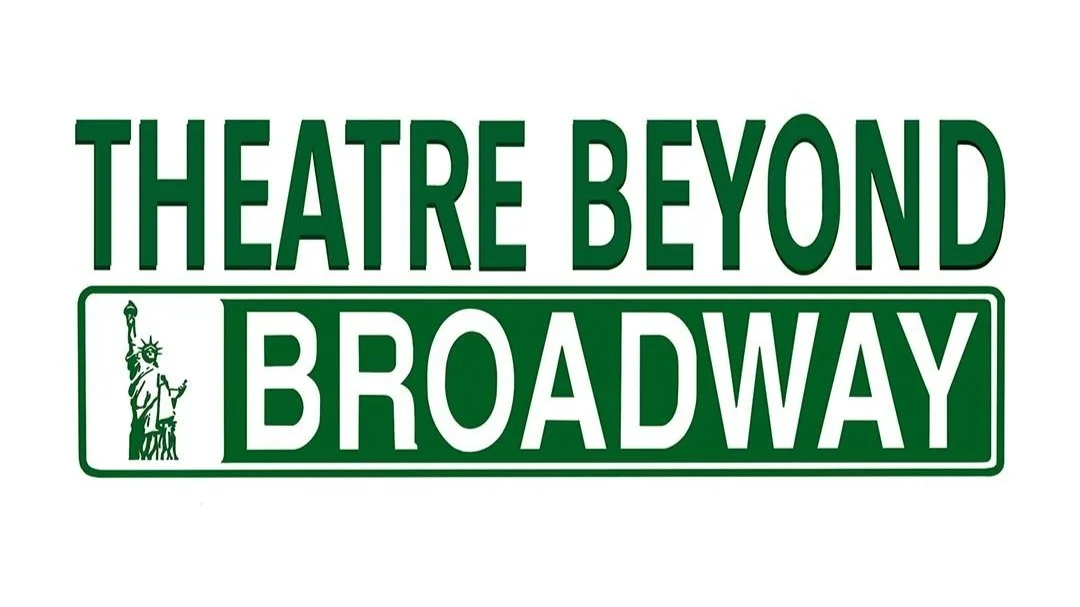
I n Who We Become Part 2: Breakfast at the Track / A Poster of the Cosmos, we find the second set of Lanford Wilson’s one-act plays, selected by New York-based theatre company Deep Flight Productions for performance at the Edinburgh Fringe this year. Admittedly, following The Moonshot Tape in this two-part series’ first instalment – especially Margaret Curry’s powerful solo turn as an abuse victim shaping the narrative of her past – is a tall order. The Moonshot Tape displays some of the greatest literary and dramatic flair of the late Pulitzer prize-winner’s deep cuts: a fiercely felt and emotionally vast piece of writing, elegantly mustered and executed by Curry, who also serves as executive producer of Deep Flight Productions.
n Who We Become Part 2: Breakfast at the Track / A Poster of the Cosmos, we find the second set of Lanford Wilson’s one-act plays, selected by New York-based theatre company Deep Flight Productions for performance at the Edinburgh Fringe this year. Admittedly, following The Moonshot Tape in this two-part series’ first instalment – especially Margaret Curry’s powerful solo turn as an abuse victim shaping the narrative of her past – is a tall order. The Moonshot Tape displays some of the greatest literary and dramatic flair of the late Pulitzer prize-winner’s deep cuts: a fiercely felt and emotionally vast piece of writing, elegantly mustered and executed by Curry, who also serves as executive producer of Deep Flight Productions.
Contains brief glimpses of beauty, emotional nuance and genuinely terrific acting
The second part of the Who We Become series is performed on alternating days to the first, on the same stage at the theSpace @ Surgeons’ Hall, with an equally minimalist approach to scenic design. In The Moonshot Tape, this stripped-back layout allowed greater emphasis on Wilson’s cutting language, enabling the words to fill the intimate space, as well as Curry’s calculated movements throughout. The benefits of minimalist staging in this second part – particularly in A Poster of the Cosmos – are less clear. There is an oppressive emphasis on stasis in this monologue’s staging, an explicit directorial decision that is initially appreciated but later, once the monologue moves between scenes, situations and interactions, feels ambivalent. There is an essential lack of clarity in A Poster of the Cosmos, which, while orbiting the central setup of an interrogation seat, could have benefited from greater movement to communicate more effectively its narrative and psychology – both of which are complex.
While The Moonshot Tape contains moments of comedy despite its harrowing subject matter, A Poster of the Cosmos contains none. On the other hand, Breakfast at the Track, the other short play presented in this part of Who We Become, is packed full of absurdist circularities and meaningless repetitions that highlight – in a vaguely humorous way – the lack of meaningful feelings in the central relationship of a married couple. This, coupled with A Poster of the Cosmos, a drama about homosexuality and the Aids epidemic, creates an aggressive tonal shift across the pieces, which feels too stark to justify the pairing. Where the first part shines as an isolated one-act play, this second part does not work on the same level – as a Fringe show, but also as drama – since neither play presented here is as effective a piece of writing as The Moonshot Tape.
That said, the second part contains brief glimpses of beauty, emotional nuance and genuinely terrific acting. I will be recommending Deep Flight Productions and this innovative two-part Lanford Wilson series as one of the lesser-spotted gems and welcome surprises of this year’s festival.
© A. A. Lewis - broadwaybaby.com/
 Deep Flight Productions is presenting the limited Off Broadway engagement of Lanford Wilson’s THE MOONSHOT TAPE and A POSTER OF THE COSMOS, directed by Mark Cirnigliaro and starring Margaret Curry* and Geoff Stoner. A pair of one-act plays about taking control of destiny and retaliating against fate, THE MOONSHOT TAPE & A POSTER OF THE COSMOS opens its one-week limited engagement at Off-Broadway’s The Siggy at the Flea this WEDNESDAY, FEBRUARY 21st at 7PM.
Deep Flight Productions is presenting the limited Off Broadway engagement of Lanford Wilson’s THE MOONSHOT TAPE and A POSTER OF THE COSMOS, directed by Mark Cirnigliaro and starring Margaret Curry* and Geoff Stoner. A pair of one-act plays about taking control of destiny and retaliating against fate, THE MOONSHOT TAPE & A POSTER OF THE COSMOS opens its one-week limited engagement at Off-Broadway’s The Siggy at the Flea this WEDNESDAY, FEBRUARY 21st at 7PM.
Get a first look at photos below!
THE MOONSHOT TAPE and A POSTER OF THE COSMOS unite in a compelling evening of one-act plays by the celebrated American playwright Lanford Wilson. In these monologues, Wilson intricately explores themes of love, human sexuality, and the profound impact our surroundings and relationships have on shaping our identities. The plays are a poetic and cataclysmic journey, unraveling inward, chaotic, and exhilarating truths that resonate on deeply personal and universally relevant levels.
Read more: First Look at THE MOONSHOT TAPE And A POSTER OF THE COSMOS at the Flea


